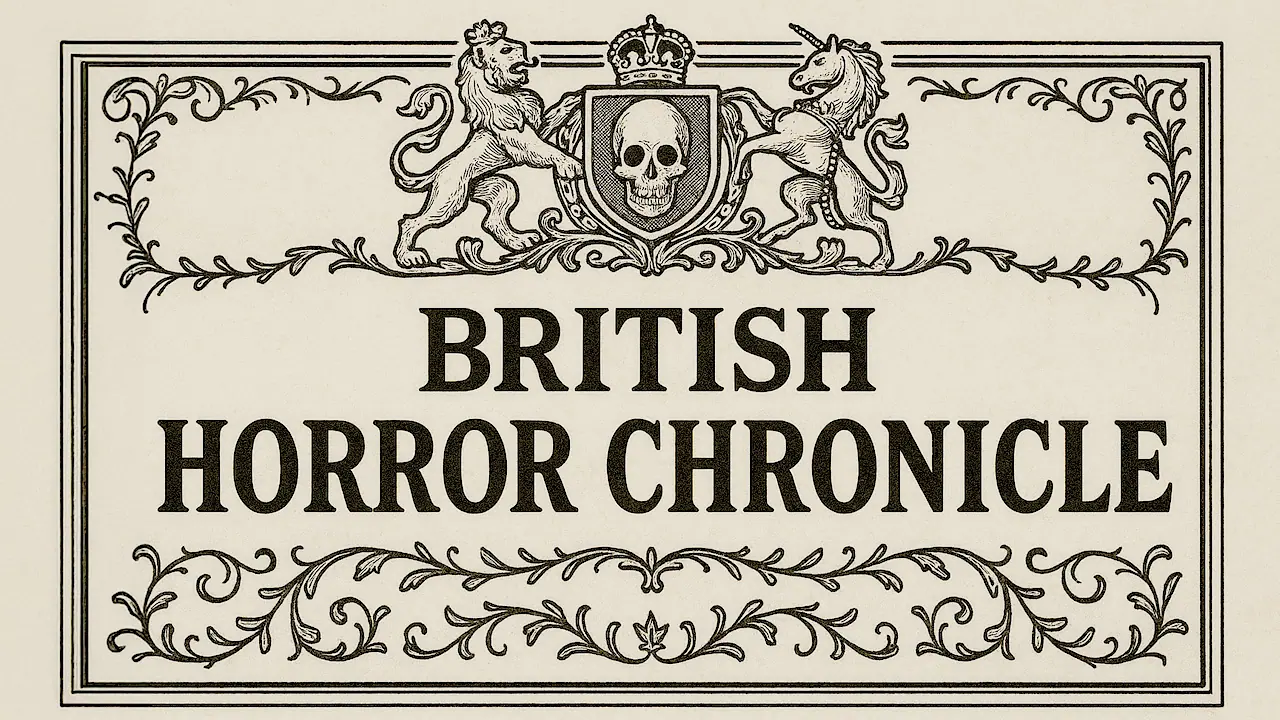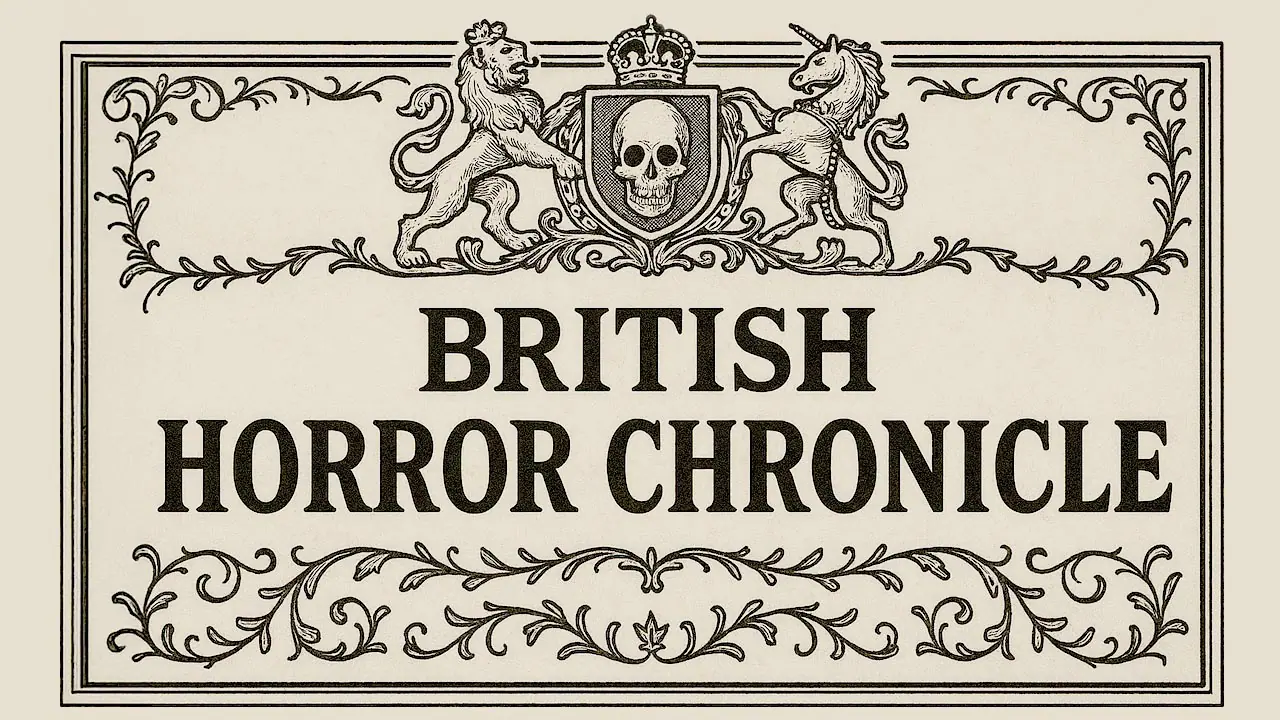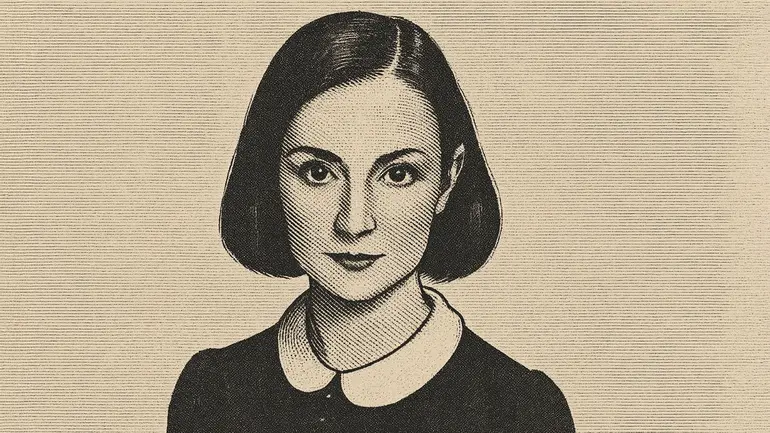Miss Sarah Daly shares her singular journey with Mr Lawrie Brewster.
Miss Sarah Daly stands among the most quietly formidable figures shaping the landscape of independent British horror today. An Irishwoman whose journey from Ireland to Scotland has yielded a legacy of lyrical terror and artistic resolve, she is the subject of this third instalment in our ongoing Filmmaker Profiles series.
Having previously profiled the distinctive talents of Mr Tony Mardon and Mr Andy Edwards, we now turn our attention to Miss Daly’s profound influence upon the British horror scene.
In an era where the cinematic conversation is so often commandeered by the breathless heralding of corporate ventures dressed in independent garb, it becomes ever more vital to draw attention to the authentic voices of our time. Miss Sarah Daly is such a voice. She is not merely an observer of the indie horror world but a central architect in its reconstruction.
The Pen Behind the Owlman
Best known as the co-founder and principal creative of Hex Studios, Miss Daly has spent over a decade guiding the production of numerous award-winning features. Her pen brought to life Lord of Tears, which introduced the now-iconic Owlman to popular culture, and The Unkindness of Ravens, a bleakly poetic work that premiered at FrightFest.
A woman of manifold talents, Miss Daly is not only a writer and producer but also a published poet and accomplished musician. Under the moniker ‘Metaphorest’, she gained early recognition for her work alongside Mr Joseph Gordon-Levitt, with one of her songs performed by Miss Sia, and her screenplays praised by luminaries such as Mr Gary Oldman and Miss Anne Hathaway.
Founding a Studio with Soul
Yet Miss Daly eschewed the path to Hollywood in favour of something more noble: the nurturing of a genuinely independent British horror institution. Hex Studios, founded in Kirkcaldy in 2011, emerged not as a corporate entity but as a collective of dreamers, whose output was powered by thrift, ingenuity, and unyielding passion. In its earliest days, Miss Daly even organised the Dysart Sail-In Film Festival, which drew thousands, and which was attended by Prime Minister Gordon Brown.
In recent years, she has furthered her mission through the establishment of Fife Creative Studios, a charitable body devoted to cultivating regional talent and championing genre storytelling.
Miss Daly is no stranger to the hardships faced by filmmakers operating beyond the mainstream. Her strategy has been one of elegant self-reliance. With no assured means of commercial support, she has embraced direct audience engagement via platforms such as Kickstarter and Patreon, building a grassroots network known as the British Horror Studio. Under her guidance, Hex Studios has remained unbowed by trends, algorithms or industrial fads.
Revered in the Shadows
Though she may not be a household name, Miss Daly enjoys reverence amongst those in the know. Her work commands admiration for its beauty and its bravery. And it is telling that she continues to exert influence while often declining the limelight herself.
Miss Daly, cousin to songstress Miss Kate Bush, possesses a spirit that is at once ethereal and defiant. She is proof that genuine creative vision, unspoiled by the mechanisms of commerce, may yet thrive.
For the young artist wondering whether one must compromise to create, her story stands as a rallying cry: forge your own path. Take your own risks. Haunt your own dreams.
More than a filmmaker, Sarah Daly is an enduring creative force whose finest work may still lie ahead.
Miss Sarah Daly in Conversation
A Dialogue with Lawrie Brewster
Mr Lawrie Brewster: Miss Daly, when first we became acquainted, it was via a modest filmmaking forum where you were sharing scripts with remarkable dedication, all whilst holding down numerous occupations. Your tenacity, I must admit, spurred me into action. Have you always possessed the ambition to work in the film industry? Might you recount your path?
Miss Sarah Daly: Growing up in a quiet Irish town, a career in cinema felt so improbable that it scarcely crossed my mind. However, I have always delighted in creating. As a child, I wrote endlessly—poetry, prose, lyrics—and busied myself with all manner of artistic pursuits. Our household television received but two Irish channels, broadcasting primarily vintage American programmes. Yet I was enthralled. The local library and video rental shop became my sanctuaries. The raw ingredients of a creative life were present, even if not fully formed.
I properly began my journey into film at the age of eighteen, when I chose to study Media Arts at Dublin Institute of Technology. The course was wide-ranging—television, cinema, photography, even French. I was not always confident in the practical elements, nor was I entirely at ease with university life. Yet screenwriting, with its marriage of structure and imagination, captivated me. It allowed both the logical and lyrical parts of my mind to co-exist.
Upon graduation, I resolved to pursue a life as a screenwriter. However, the path was far from straightforward. I spent years in uninspiring roles—transcribing airline manuals, formatting market research reports—all the while writing scripts in my spare time. A few small freelance positions came my way, including script reading and the odd commission, but a true career still seemed out of reach.
I should mention, a film degree is by no means essential. Yet for me, that opportunity to explore several disciplines allowed me to discover the one for which I had a natural inclination. For those who know what they wish to do, I would simply advise them to begin without hesitation.
Mr Lawrie Brewster: Let us now address the genesis of Hex Studios. Many will not know the tale. How did you come to join forces with a certain slightly overweight but still strangely handsome Scottish horror filmmaker?
Miss Sarah Daly: Around two years after university, I joined a rather no-frills website known as DVXUser. It offered aspiring filmmakers a place to converse and collaborate. One of its finest features was a monthly filmmaking competition based on thematic prompts. For a writer like myself, it proved a godsend—an opportunity to see my scripts transformed into living cinema.
One such collaborator was yourself, Mr Brewster. We discovered, quite swiftly, a shared sensibility. We produced a flurry of short films and, through a remarkable twist of fate, became involved in a series of collaborative shorts with Mr Joseph Gordon-Levitt and Mr Channing Tatum. These premiered at Sundance and South by Southwest. It became apparent that, together, we could achieve great things. So, in 2010, I departed Dublin for Kirkcaldy.
You had then a corporate video business, so initially we worked on projects for local arts organisations. Yet our true aspiration remained unwavering. Within months, we shot numerous short films and began learning in earnest.
During the harsh winter of 2010, we embarked upon our first feature film. I had received a DSLR camera from my brother Marc, and the snow-laden streets of our village served as the perfect setting for White Out, a low-budget apocalyptic tale. With the help of a handful of friends and my own musical contributions, we brought the film to life. Though modest, it paved the way for our next effort, the more traditional horror feature Lord of Tears. Thus, Hex Media was born—later rechristened Hex Studios.
Fifteen years on, our partnership has endured both the sublime and the trying. Together we have constructed the British Horror Studio, encompassing Hex Studios, Amicus Productions, and our new venture, the B-Team. Though the journey has been arduous, our dedication to original, independent storytelling remains undiminished.
Mr Lawrie Brewster: In addition to your contributions at the British Horror Studio, you remain active as a musician and poet. Would you care to elaborate upon these other creative disciplines? I often tell young filmmakers that diversity of talent is vital.
Miss Sarah Daly: It is difficult to choose a favourite. Each discipline fulfils a different artistic need.
Cinema, of course, is the most immersive of all mediums. To construct a world in one’s imagination and then realise it on screen is a wondrous thing. But it brings constraints—logistical, financial, practical. The imagination is infinite, but film budgets are not.
Poetry and prose, by contrast, are bound only by one’s thoughts. They provide a freedom that is most welcome. Poetry in particular offers a cathartic release. It can seem self-indulgent, but I have come to believe that when one expresses a personal truth, it often resonates with others. That, at least, is what gives me courage to continue.
Music is something else entirely. The way in which melody and lyric can stir emotion is unlike anything else. It is also the only medium in which I use my literal voice. It is a vulnerable act, but one that brings a unique sense of expression.
Mr Lawrie Brewster: Miss Daly, you are also the guiding force behind Fife Creative Studios, a charitable organisation with admirable ambitions. Would you care to tell us more about the aims of the charity and what you hope to accomplish?
Miss Sarah Daly: Fife has not traditionally been a place associated with the motion picture arts. Most residents would consider a career in filmmaking unattainable without relocating to Glasgow or, more often, London. My ambition is to alter that perception and to do so in a direct and grassroots manner.
Fife Creative Studios exists to offer aspiring creatives the means to learn, connect, and produce work together. The charity provides access to resources and training to give individuals that crucial first step toward their ambitions. Its ethos is built upon accessibility, encouragement, and practical support in a region where the arts are often regarded as fanciful or unattainable.
We have already delivered dozens of workshops, networking opportunities, and productions. Still, there is more to do. I dream of establishing a local film festival and continuing to remove the traditional barriers that keep many from participating in this craft. Filmmaking should not be the preserve of the privileged. The charity’s central tenet is to create access for all.
Mr Lawrie Brewster: There are many romantic notions surrounding the world of film. Are there any myths about the industry that you would care to dispel?
Miss Sarah Daly: Firstly, it is not a glamorous profession. The public may picture red carpets and gala events, but the truth is far more prosaic. One is more likely to be found freezing atop a Scottish hillside at four in the morning than sipping champagne. While such moments may appear prestigious, they are often fleeting and superficial. What matters, truly, is the opportunity to tell stories, to collaborate with inspiring people, and to challenge oneself artistically.
Another misconception is that filmmakers are financially well-off. This is seldom the case, particularly within the independent sphere. Making even a modest living is a challenge. Anyone drawn to the industry in pursuit of wealth may wish to consider a different path entirely.
That said, if film is your calling, no other vocation will suffice.
Mr Lawrie Brewster: You are best known for your work in the horror genre. Has this always been your preference, and are there other genres that appeal to you?
Miss Sarah Daly: I have always been drawn to horror, although in my youth it was perhaps more literary than cinematic. I read a great deal of Mr Stephen King and spent late nights watching The Twilight Zone. That sense of the eerie has always appealed to me.
That said, I am particular about the sort of horror I enjoy and write. For me, it is about mystery, atmosphere, twists, and the creation of alternative realities. Horror allows one to address difficult topics with candour, cloaked in metaphor and mood. It is a poetic medium, one that permits exaggeration, surrealism, and imaginative freedom. I would find it difficult now to write something bound strictly to real-world rules.
Outside of horror, I have a deep love of science fiction. I admire the work of writers such as Mr Ray Bradbury, Mr Walter Tevis, and Mr Philip K. Dick. A personal dream of mine would be to write an episode of Black Mirror.
Mr Lawrie Brewster: A final, substantial question. In your view, what makes a great story?
Miss Sarah Daly: It is, to me, quite simple. Characters must be at the heart. One may have the most ingenious concept, but without compelling characters, the story will lack resonance. The audience must care, even if the protagonist is flawed.
Ideally, characters should undergo change. They must be shaped by their trials, and in the most powerful stories, we too are changed by witnessing that transformation. Beyond that, I look for escalating tension, a central question that draws the audience forward, and a clear thematic core. The story need not carry a grand moral, but it must hold together in tone and meaning.
To summarise, I would say that the finest stories depict personal struggles with universal significance.
About Miss Sarah Daly
Miss Sarah Daly is an Irish writer, filmmaker, and musician, known for her lyrical storytelling and affinity for the uncanny. As co-founder of Hex Studios, she has penned several cult horror favourites including Lord of Tears, while also composing music under the name Metaphorest. She is the founder of Fife Creative Studios, a charity devoted to making filmmaking accessible to all.
You may follow Miss Daly’s work via her Patreon, where she shares regular updates alongside her poetry and music. She is active on Instagram, Twitter, Threads, YouTube, and SoundCloud.
You may watch a more modern version of this interview over here.
About Mr Lawrie Brewster
Mr Lawrie Brewster is a producer and director with fifteen years of experience in independent horror cinema. He leads Hex Studios, serves as President of Amicus Productions, and oversees the British Horror Studio initiative.
For further information, visit www.lawriebrewster.com.


